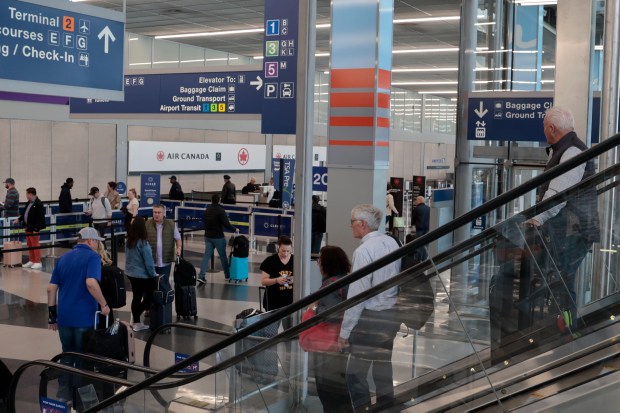Months ago, after then-President-elect Donald Trump started talking about implementing tariffs early in his second term, Leslie King sent an email to her bosses.
King, who’s been selling appliances at Abt Electronics in Glenview for about 21 years, was seeking guidance about what to tell customers worried about tariffs. Eventually, the company had an internal discussion about what to say, King said.
“We have to have a way to address it and make people feel not nervous because everything is expensive enough right now,” she said.
At the moment, King tries to reassure tariff-wary buyers that putting a deposit on appliances locks in their prices — prices which may rise significantly after tariffs are imposed. And according to an Abt Electronics spokesperson, people have been buying appliances before they really need to in an effort to save money.
Trump on Monday put off imposing 25% tariffs on all Mexican and Canadian goods for 30 days to allow more negotiations after the countries agreed to do more to halt the flow of illegal drugs and people entering the United States without legal permission. But Tuesday, Trump went ahead with a 10% tariff on all Chinese products.
The new tariff on China will take a toll on trade between Illinois and China. It could really complicate matters for farmers in the state, who worry more retaliatory tariffs could be placed on the agricultural products they export if the nations’ trade war escalates. The new and proposed tariffs could also increase the cost of appliances as well as building supplies, inflating the price of everyday home repairs as well as large building projects such as the one at O’Hare International Airport.
Gov. JB Pritzker on Wednesday referred to the tariffs on the three countries as Trump’s tax on working families.
“He’s pushing us into an unwanted trade war with our closest allies and partners,” Pritzker wrote on X, formerly Twitter. “And who will feel the consequences? Everyday Americans.”
In 2023, Illinois bought about $44 billion in imports from China, including about $27 billion in computer and electronic products, according to the Illinois Department of Commerce and Economic Opportunity. Tariffs are paid by U.S. importers, who often try to pass along the higher costs to consumers through higher prices.
China promptly retaliated by imposing tariffs on U.S. products, including coal and big cars. It also is restricting exports of critical minerals and launching an antitrust investigation into Google.
In 2023, China was the fourth-largest purchaser of Illinois exports after Canada, Mexico and Germany, according to the state commerce department.
Cécile Shea, a fellow with nonprofit Chicago Council on Global Affairs, warned Chicagoland would suffer greatly if the U.S. keeps imposing tariffs and other countries retaliate on certain industries.
“We’re a banking capital here in Chicago and an insurance capital,” Shea said. “If countries decide to retaliate against life insurance companies or banking companies or long distance medical consulting companies, that’s going to hurt Chicagoland. But I haven’t heard of China doing too much of that.”
In Shea’s mind, the tariffs on Canada and Mexico would have been “disastrous” for the U.S. for many reasons, including the fact that the U.S. buys a great deal of food from its neighbors.
However, the U.S. doesn’t import much food from China. And, Shea added, the U.S. has been imposing tariffs on some Chinese imports since the first Trump term and former President Joe Biden actually implemented more.
“Companies now have adjusted to the new normal in various ways, and so now there’s going to be 10% more on top of those, which is significant,” Shea said. “But over the last eight years, companies, including some companies in Chicagoland for instance, have moved some of their manufacturing from China to Vietnam or Latin America. Some of them have moved it back to the U.S.”
Even economists and politicians who normally oppose tariffs seem to agree that some tariffs on China make sense in the current economic climate and political environment, according to Shea.
However, the tariffs from Trump’s first term and the new ones have been criticized for being too broad, Shea said. In the past, countries that used tariffs used them very intentionally — they’d use tariffs to target industries which a foreign government was giving unfair subsidies to, for example.
“There’s a lot of agreement that (intentional tariffs) make sense both because China does not always play completely fair in terms of competition and also because of real concerns about how the size of its economy could impact global security,” Shea said.
Chicagoland Associated General Contractors, a trade association for commercial builders, put on a webinar on tariffs for its members Tuesday.
Tom Cuculich, association executive director, said as with everyday products, many products used in construction are not manufactured in the U.S.
While a good amount of the steel used in the Midwest is made in the U.S., lots of lumber used here comes from Canada and lots of components for HVAC systems and other electronic building systems come from Asia and particularly China, Cuculich said.
The trade association has been monitoring the tariff talks for months in order to keep its members informed about what could happen to prices and supply lines.
“What (tariff talks) have created is uncertainty,” Cuculich said. “And when there’s uncertainty, there’s risk. And risk in construction means money and delays in projects. We are heartened by the fact that the Mexico and Canada tariffs have been suspended, so that does bring a little bit more certainty to the market.”
Cuculich said one focus of the webinar was contracts — and specifically, the importance of including clauses which protect builders if tariffs do increase prices.
In LaSalle County, which is about 90 miles southwest of Chicago, David Isermann has been keeping a close eye on the tariff talks as well.
Isermann, who’s president of the LaSalle County Farm Bureau, said U.S. agriculture is dependent on exports.
About 20% of agricultural and food products made in the U.S. are sold in international markets, according to the U.S. Agriculture Department. And China was the largest buyer of U.S. agricultural exports in fiscal year 2023, followed by Mexico and Canada.
“(Tariff talks) become concerning to us because what usually happens is if you put a tariff on somebody, they’re going to retaliate by putting a tariff back on you,” Isermann said. “And it seems to be they like to put the retaliation on agricultural products.”

Isermann said during the first Trump term in 2018, China responded to U.S. tariffs by putting tariffs on U.S. soybeans, instead buying soybeans from Brazil.
U.S. farmers received some payments from the government to make up for the loss of soybean business, but it was only for the first year of tariffs, Isermann said. U.S. farmers are just now starting to get some of that soybean export business back, he added.
Currently, farmers in Illinois are getting ready to plant crops and looking at their finances. In order to plant, farmers need to borrow “tremendous amounts of money,” Isermann said.
“We’ve either talked to our banker or are going to talk to our banker,” Isermann said. “And we have to explain how we’re going to get through this.”
Farmers don’t know for sure how much they will have to pay for imported agricultural supplies such as fertilizer, since their prices could go up if the U.S. implements more tariffs within the next month. And they can’t be sure about how much they’ll be able to sell their products for because other countries may put retaliatory tariffs on U.S. exports in the coming months.
Pat Cardoni, president of the Chicago chapter of the Building Industry Association of Greater Chicago and of Cardoni Custom Homes, said if the proposed tariffs on Canada go into effect, there may be a short-term increase in prices on materials such as lumber, and American homebuilders may look elsewhere for some of their goods.
He thinks the Trump administration’s discussion around lowering housing costs is a positive since they are so high, especially in Chicago, but the proposed tariffs seem like a “political football.”
The National Association of Home Builders denounced the proposed tariffs and said in a Saturday news release that more than 70% of softwood lumber and gypsum (used for drywall) imports come from Canada and Mexico, respectively, two essential materials for homebuilders.
Tariffs also have the potential to hit the massive overhaul of O’Hare International Airport, one credit rating agency has said. The project is set to replace Terminal 2 with a new Global Terminal and add two satellite concourses.
In December, before Trump took office, Moody’s analysts said in a credit rating report potential changes to tariffs and immigration policy could pose risks for the costs of the project, especially since so little of the work had been locked in with construction contracts.
“With a renewed potential for an inflationary environment in 2025 with changes to tariffs and immigration policy, this poses risks to the cost of completing construction,” the analysts wrote, while praising an agreement the city and airlines reached in the spring.
At that time, 17.5% of the project had been contracted out, according to Moody’s.
“O’Hare is not unique in facing potential increased construction costs from tariffs, which we think could increase construction budgets for future contracts,” Moody’s analyst Earl Heffintrayer said in a recent statement.
Chicago Department of Aviation officials said in a statement they were monitoring tariffs and other market conditions, but it was too early to determine any potential effects on the airport project.
The Associated Press contributed.




